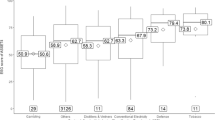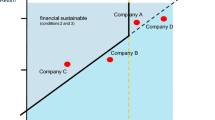Abstract
The impact of green credit on banks has been widely verified. This paper systematically combs the internal mechanism of the impact of green credit on high-quality sustainable development of banks and studies the relationship between green credit and high-quality sustainable development of banks by using unbalanced panel data of Chinese listed banks from 2007 to 2019. The results show that green credit will significantly promote high-quality sustainable development of banks, which remains valid after controlling for relevant variables and robustness test. The further test results show that the impact of green credit on high-quality sustainable development of banks will be affected by green environment supervision and monetary policy. Green environment supervision and loose monetary policy promote the positive impact of green credit on high-quality sustainable development of banks. The heterogeneity test results show that the impact of green credit on high-quality sustainable development of banks is significantly different among banks with different business scope and different size, and the positive impact of green credit on high-quality sustainable development of small-scale banks and regional banks is more significant. This paper enriches the research of the impact of green credit on banks.
Similar content being viewed by others
Data availability
The datasets used or analyzed during the current study are available from the corresponding author on reasonable request.
References
Aizawa M, Yang C (2010) Green credit, green stimulus, green revolution? China’s mobilization of banks for environmental cleanup. J Environ Dev 19(2):119–144
Altavilla C, Boucinha M, Peydró JL (2018) Monetary policy and bank profitability in a low interest rate environment. Economic Policy 33(96):531–586
An S, Li B, Song D, Chen X (2021) Green credit financing versus trade credit financing in a supply chain with carbon emission limits. Eur J Oper Res 292(1):125–142
Cui Y, Geobey S, Weber O, Lin H (2018) The impact of green lending on credit risk in China. Sustainability 10(6):2008
Dikau S, Volz U (2021) Central bank mandates, sustainability objectives and the promotion of green finance. Ecol Econ 184:107022
Hu Y, Jiang H, and Zhong Z (2020). Impact of green credit on industrial structure in China: theoretical mechanism and empirical analysis. Environ Sci Pollut Res, 1–14
Lee CC, Wang CW, Ho SJ (2020) Financial innovation and bank growth: the role of institutional environments. North Am J Econ Finance 53:101195
Lei X, Wang Y, Zhao D et al (2021) The local-neighborhood effect of green credit on green economy: a spatial econometric investigation. Environ Sci Pollut Res 28(46):65776–65790
Li,W, Cui G, and Zheng M (2021). Does green credit policy affect corporate debt financing? Evidence from China. Environmental Science and Pollution Research, 1–10
Li S, Wang H, Liu X (2022) The impact of carbon tax on financial stability[J]. Environmental Science and Pollution Research, 1–13.
Lian Y, Gao J, Ye T (2022) How does green credit affect the financial performance of commercial banks?——Evidence from China. J Clean Prod 344:131069
Liu X, Wang E, Cai D (2019) Green credit policy, property rights and debt financing: quasi-natural experimental evidence from China. Financ Res Lett 29:129–135
Luo S, Yu S, and Zhou G (2021). Does green credit improve the core competence of commercial banks? Based on quasi-natural experiments in China. Energy Econ 105335
Nabeeh NA, Abdel-Basset M, Soliman G (2021) A model for evaluating green credit rating and its impact on sustainability performance. J Clean Prod 280:124299
Scholtens B, Dam L (2007) Banking on the equator. Are banks that adopted the equator principles different from non-adopters? World Dev 35(8):1307–1328
Wang H, Li S (2021) Optimization of systemic risk: reallocation of assets based on bank networks. J Risk 23(3):31–56
Xing C, Zhang Y, Tripe D (2021) Green credit policy and corporate access to bank loans in China: the role of environmental disclosure and green innovation. Int Rev Financ Anal 77:101838
Yang Y, Su X, Yao S (2021) Nexus between green finance, fintech, and high-quality economic development: empirical evidence from China. Resour Policy 74:102445
Yao S, Pan Y, Sensoy A, Uddin GS, Cheng F (2021) Green credit policy and firm performance: what we learn from China. Energy Econ 101:105415
Yin W, Zhu Z, Kirkulak-Uludag B, Zhu Y (2021) The determinants of green credit and its impact on the performance of Chinese banks. J Clean Prod 286:124991
Zhou G, Sun Y, Luo S, Liao J (2021) Corporate social responsibility and bank financial performance in China: the moderating role of green credit. Energy Economics 97:105190
Funding
This research is supported by the National Natural Science Foundation of China (No. 72141019) and the general project of humanities and social science research of the ministry education(21YJA630128).
Author information
Authors and Affiliations
Contributions
LD: writing. SJ: writing. YZ: supervision.
Corresponding author
Ethics declarations
Ethics approval
• The manuscript is not be submitted to more than one journal for simultaneous consideration.
•The submitted work is original and has not been published elsewhere in any form or language (partially or in full), unless the new work concerns an expansion of previous work.
• A single study is be split up into several parts to increase the quantity of submissions and submitted to various journals or to one journal over time.
• Concurrent or secondary publication is sometimes justifiable, provided certain conditions are met. Examples include translations or a manuscript that is intended for a different group of readers.
• Results is presented clearly, honestly and without fabrication, falsification or inappropriate data manipulation (including image-based manipulation). We adhere to discipline-specific rules for acquiring, selecting and processing data.
No data, text or theories by others are presented as if they were the author’s own (‘plagiarism’). Proper acknowledgements to other works are given (this includes material that is closely copied (near verbatim), summarized and/or paraphrased), quotation marks (to indicate words taken from another source) are used for verbatim copying of material and permissions secured for material that is copyrighted.
Consent to participate
Yes.
Consent for publication
Yes.
Competing interests
The authors declare no competing interests.
Additional information
Responsible Editor: Nicholas Apergis
Publisher's Note
Springer Nature remains neutral with regard to jurisdictional claims in published maps and institutional affiliations.
Highlights
•Green credit promotes high-quality sustainable development of banks.
•Green environment supervision promotes the positive impact of green credit on high-quality sustainable development of banks.
•Loose monetary policy promotes the positive impact of green credit on high-quality sustainable development of banks.
•The positive impact of green credit on high-quality sustainable development of small-scale banks and regional banks is more significant.
Rights and permissions
About this article
Cite this article
Ding, L., Zhuang, Y. & Jiang, S. Green credit and high-quality sustainable development of banks. Environ Sci Pollut Res 29, 80871–80881 (2022). https://doi.org/10.1007/s11356-022-21438-w
Received:
Accepted:
Published:
Issue Date:
DOI: https://doi.org/10.1007/s11356-022-21438-w




